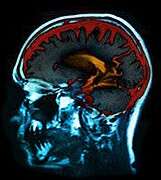Cobalamin defects can explain neurologic regression in children

(HealthDay)—Cobalamin defects can account for neurologic regression in healthy children, according to a case report published online Dec. 15 in Pediatrics.
Jena M. Krueger, M.D., from the Northwestern University Feinberg School of Medicine in Chicago, and colleagues reported the case of an 8-year-old boy who presented with a month-long history of waxing and waning encephalopathy and acute regression followed by seizures.
Following evaluation for a metabolic disorder, the researchers identified methylmalonic acidemia and hyperhomocysteinemia of the cobalamin C type, which was a result of a single, presumed homozygous pathogenic c.394 C>T mutation in the MMACHC gene. The patient improved significantly with vitamin replacement and appropriate diet restrictions, and returned to his premorbid level of behavior.
"This case illustrates an unusual presentation of a treatable metabolic disorder and highlights the need to consider cobalamin defects in the differential diagnosis of healthy children with neurologic regression," the authors write.
More information:
Abstract
Full Text (subscription or payment may be required)
Copyright © 2014 HealthDay. All rights reserved.

















